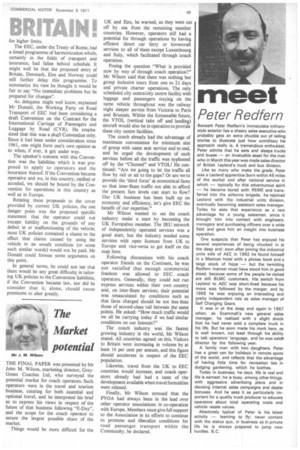The Market potential
Page 51

If you've noticed an error in this article please click here to report it so we can fix it.
THE FINAL PAPER was presented by Mr John M. Wilson, marketing director, GreyGreen Coaches Ltd, who surveyed the potential market for coach operators. Such operators were in the travel and tourism business, catering for both essential and optional travel, and he interpreted his brief as to express his views in respect of the future of that business following "E-Day", and the scope for the coach operator to secure the largest possible share of the market.
Things would be more difficult for the UK and Eire, he warned, as they were cut off by sea from the remaining member countries. However, operators still had a potential for through operations by having efficient direct car ferry or hovercraft services to all of them except Luxembourg and Italy, which facilitated through coach operation.
Posing the question "What is provided now by way of through coach operation?"
Mr Wilson said that there was nothing but group inclusive tours from one to 21 days and private charter operations. The only scheduled city centre/city centre facility with luggage and passengers staying on the same vehicle throughout was the railway night sleeper service from Victoria to Paris and Brussels. Within the foreseeable future, the VTOL (vertical take off and landing) aircraft would also be in operation to provide these city centre facilities.
The coach already had the advantage of maximum convenience for minimum size of group with same seat service end to end, and he urged the development of such services before all the traffic was syphoned off by the "Chunnel" and VTOL! He con tinued: "Are we going to let the traffic all flow by rail or air to the gaps? Or are we to provide the 'third force' at economical fares so that inter-State traffic not able to afford the present fare levels can start to flow?
Our UK business has been built up on economy and efficiency, let's give EEC the benefit of our expertise."
Mr Wilson wanted to see the coach industry make a start by becoming the UK Europabus member. The IRU network of independently operated services was a good start, but the industry needed some services with open licences from UK to Europe and vice-versa to get itself on the map here.
Following discussions with his coach operator friends on the Continent, he was not satisfied that enough commercial freedom was allowed to EEC coach operators. Generally, they could not run express services within their own country and, on inter-State services, their potential was emasculated by conditions such as that fares charged should be not less than those of second-class rail between the same points. He asked: "How much traffic would we all be carrying today if we had similar conditions on our licences?"
The coach industry wai the fastest growing industry in the world, Mr Wilson stated. All countries agreed on this. Visitors to Britain were increasing in volume by at least 16 per cent per annum, and this figure should accelerate in respect of the EEC population.
Likewise, travel from the UK to EEC countries would increase, and coach oper ators already had had a taste of the development available when travel formalities were relaxed.
Finally, Mr Wilson stressed that the PVOA had always been in the lead over other operator associations in co-operation with Europe. Members must give full support to the Association in its efforts to continue to promote and liberalize conditions for road passenger transport within the Community, he declared.




































































































































































